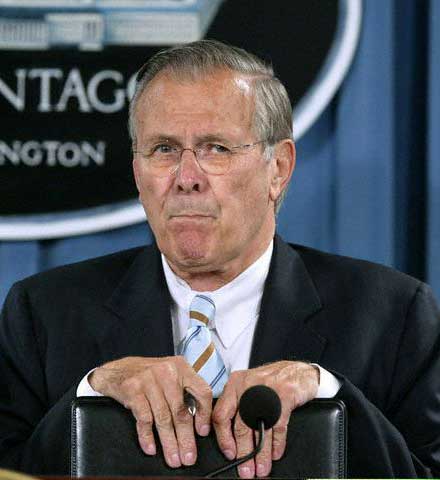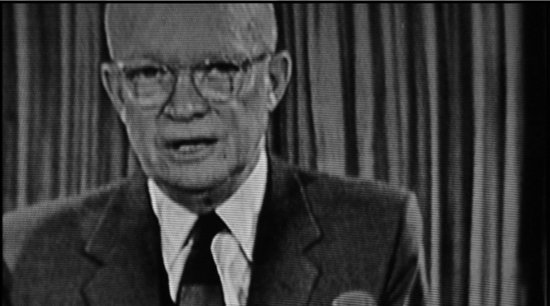Where does the GOP’s commitment to free market fundamentalism reach its limit? Where there’s money to be made, of course. The Post looks into the rise of no-bid contracts under Dubya. “A recent congressional report estimated that federal spending on contracts awarded without ‘full and open’ competition has tripled, to $207 billion, since 2000, with a $60 billion increase last year alone.”
Tag: Defense Industry
Gates, See Clifford.
“It’s not quite clear what George W. Bush wants Robert Gates to do. But it’s doubtful Gates would have come back to Washington, from his pleasant perch as president of Texas A&M, if the job description read ‘staying the course on Iraq.’” Invoking Clark Clifford to make his case, Slate‘s Fred Kaplan suggests what incoming SecDef Robert Gates may be able to accomplish over the next two years.
Rum Out.
Christmas in November continues for the reality-based community: Along with recent editorials in the Army Times, the Dem’s Election 2006 takeover claims another high-profile GOP victim in Donald Rumsfeld. He’ll be replaced by former CIA chief Robert Gates — an old papa Bush hand and current member of the Baker-Hamilton commission — for Dubya’s last two lame duck years. Dubya claimed in his press conference that Rumsfeld would’ve been gone regardless of the election returns…I’m not sure I buy that. Still, this is a very welcome move — one that should’ve happened years ago.
All the Duke’s Men.
“By himself, Cunningham had no authority to or ability to award a contract to MZM…[He] needed to secure the cooperation, or at least the non-interference, of many people: the appropriators and authorizers in Congress…the various Department of Defense (DOD) officials responsible for execution of the money…and officials of the agencies for which the contracts were to be performed. This was a lot of people to persuade, cajole, deceive, pressure, intimidate, bribe or otherwise influence to do what they wanted.” A new report by the House Intelligence Committee delves into Randy “Duke” Cunningham’s bribery operation on the Hill (or at least, it does what it can given that the GOP, acting sketchy as usual, refused to subpoena Cunningham. Can we please get a little oversight up in here?)
Dispatch War Rocket Ajax.
As threatened in the past, Dubya has apparently signed a new National Space Policy that heavily emphasizes the weaponization of space. “Theresa Hitchens, director of the nonpartisan Center for Defense Information in Washington, said that the new policy ‘kicks the door a little more open to a space-war fighting strategy’ and has a ‘very unilateral tone to it.’“
Spoils Spoiled.
As war profits begin to dry up, the Army announces it is finally ending Halliburton’s exclusive deal to provide logistical support to US troops, in favor of a multi-company approach that will hopefully spur some degree of price competition. Good news, sure, but this newly rational stance against Cheney’s pet corporation is coming more than a little bit late in the game: “The decision on Halliburton comes as the U.S. contribution to Iraq’s reconstruction begins to wane, reducing opportunities for U.S. companies after nearly four years of massive payouts to the private sector….No contractor has received more money as a result of the invasion of Iraq than Halliburton, whose former chief executive is Vice President Cheney.“
House of M.
“‘[I]t kept failing to solve any problems the Navy had,’ Lowell said. ‘It looked at first as if it might have some merit. But we found out quickly it didn’t really solve the problems. And the company wasn’t very responsive and wasn’t very robust. . . . It was living entirely’ on grants from Congress.” The WP examines Project M, a Pentagon research project kept alive on congressional earmarks (to the tune of $37 million) well past its potential usefulness. “Once begun, promising but speculative programs like Project M are hard to kill, sustained by members of Congress who want to keep jobs in their districts, military officials who want to keep their options open and businesspeople who want to keep their companies afloat.“
Update: In a related story, the Post finds Rumsfeld at the switch when it comes to the Pentagon’s antiquated military procurement system. “‘DOD is simply not positioned to deliver high-quality products in a timely and cost-effective fashion,’ the comptroller general of the United States, David M. Walker, said in a little-noticed April 5 critique. The Pentagon, he said, has ‘a long-standing track record of over-promising and un-delivering with virtual impunity.’“
Duke of Desire?
Those many Republicans banking on public inattention to the sordid tales of GOP corruption may not want to pick up today’s Post anytime soon — Sex has entered the equation. “Federal authorities are investigating allegations that a California defense contractor arranged for a Washington area limousine company to provide prostitutes to convicted former congressman Randy ‘Duke’ Cunningham (R-Calif.) and possibly other lawmakers, sources familiar with the probe said yesterday.” Uh, oh…DC just loves a good sex scandal, right, guys? Update: The limousine firm in question denies the allegations.
Fight Club.
“In the councils of government, we must guard against the acquisition of unwarranted influence, whether sought or unsought, by the military-industrial complex. The potential for the disastrous rise of misplaced power exists and will persist. We must never let the weight of this combination endanger our liberties or democratic processes.” That flaming liberal Dwight Eisenhower’s somber farewell address to the nation is the historical and thematic anchor for Eugene Jarecki’s documentary Why We Fight, a sobering disquisition on American militarism and foreign policy since 9/11. In essence, Why We Fight is the movie Fahrenheit 9/11 should have been. Like F911, this film preaches to the choir, but it also makes a more substantive critique of Dubya diplomacy and the 9/11-Iraq switcheroo, with much less of the grandstanding that marred Moore’s earlier documentary (and drove right-wing audiences berzerk.)
Sadly, the basic tale here is all-too-familiar by now. Ensconced in Dubya’s administration from the word go, the right-wing think-tank crowd (Wolfowitz, Perle, Kristol, etc.) used the tragedy of 9/11 as a pretext to enact all their neocon fantasies (spelled out in this 2000 Project for a New American Century report), beginning in Iraq. Taken into consideration with Cheney the Military-Contractor-in-Chief doling out fat deals to his Halliburton-KBR cronies from the Vice-President’s office, and members of Congress meekly signing off on every military funding bill that comes down the pike (partly because, as the film points out, weapons systems such as the B-1 or F-22 have a part built in every state), it seems uncomfortably clear that President Eisenhower’s grim vision has come to pass.
To help him rake this muck, Jarecki shrewdly gives face-time not only to learned critics of recent foreign-policy — CIA vet Chalmers Johnson, Gore Vidal (looking unwell) — but also to the neocons themselves. Richard Perle is here, saying (as always) insufferably self-serving things, and Bill Kristol glows like a kid in a candy store when he gets to talk up his role in fostering Dubya diplomacy. (Karen Kwiatkowski, a career military woman who watched the neocon coup unfold within the corridors of the Pentagon, also delivers some keen insights.) And, when discussing the corruption that festers in the heart of our Capitol, Jarecki brings out not only Charles Lewis of the Center for Public Integrity but that flickering mirage of independent-minded Republicanism, John McCain. (In fact, Jarecki encapsulates the frustrating problem with McCain in one small moment: Right after admitting to the camera that Cheney’s no-bid KBR deals “look bad”, the Senator happens to get a call from the Vice-President. In his speak-of-the-devil grimace of bemused worry, you can see him mentally falling into line behind the administration, as always.)
To be sure, Why We Fight has some problems. There’s a central tension in the film between the argument that Team Dubya is a corrupt administration of historical proportions and the notion that every president since Kennedy has been party to an increasingly corrupt system, and it’s never really resolved satisfactorily here. Jarecki wants you to think that this documentary is about the rise of the Imperial Presidency across five decades, but, some lip service to Tonkin notwithstanding, the argument here is grounded almost totally in the Age of Dubya. (I don’t think it’s a bad thing, necessarily, but it is the case.) And, sometimes the critique seems a little scattershot — Jarecki seems to fault the Pentagon both for KBR’s no-bid contracts and, when we see Lockheed and McDonnell-Douglas salesmen going head-to-head, for bidding on contracts. (Still, his larger point is valid — As Chalmers Johnson puts it, “When war becomes that profitable, you’re going to see more of it.“)
Also, the film loses focus at times and meanders along tangents — such as the remembrances of two Stealth Fighter pilots on the First Shot Fired in the Iraq war, or the glum story of an army recruit in Manhattan looking to turn his life around. This latter tale, along with the story of Wilton Sekzer, a retired Vietnam Vet and NYPD sergeant who lost his son on 9/11 and wants somebody to pay, are handled with more grace and less showmanship than similar vignettes in Michael Moore’s film, but they’re in the same ballpark. (As an aside, I was also somewhat irked by shots of NASA thrown in with the many images of missile tests and ordnance factories. Ok, both involve rockets, research, and billions of dollars, but space exploration and war are different enough goals that such a comparison merits more unpacking.)
Nevertheless, Why We Fight is well worth-seeing, and hopefully, this film will make it out to the multiplexes. If nothing else, it’ll do this country good to ponder anew both a president’s warning about the “disastrous rise of misplaced power,” and a vice-president’s assurance that we’ll be “greeted as liberators.”
Send in Sgt. Brockovich.
“The water expert said he told company officials at the base that they would have to notify the military. ‘They told me it was none of my concern and to keep my mouth shut,’ he said.” Ah, the perks of a no-bid contract. As e-mail records prove, those patriots at Halliburton, Dick Cheney’s favorite corporate cronies, have been knowingly exposing some soldiers to contaminated water, despite being warned by their own employees about the danger. “Another former Halliburton employee who worked at the base, Ken May of Louisville, said there were numerous instances of diarrhea and stomach cramps.”




